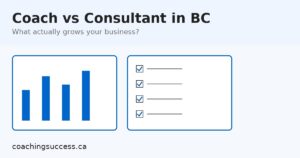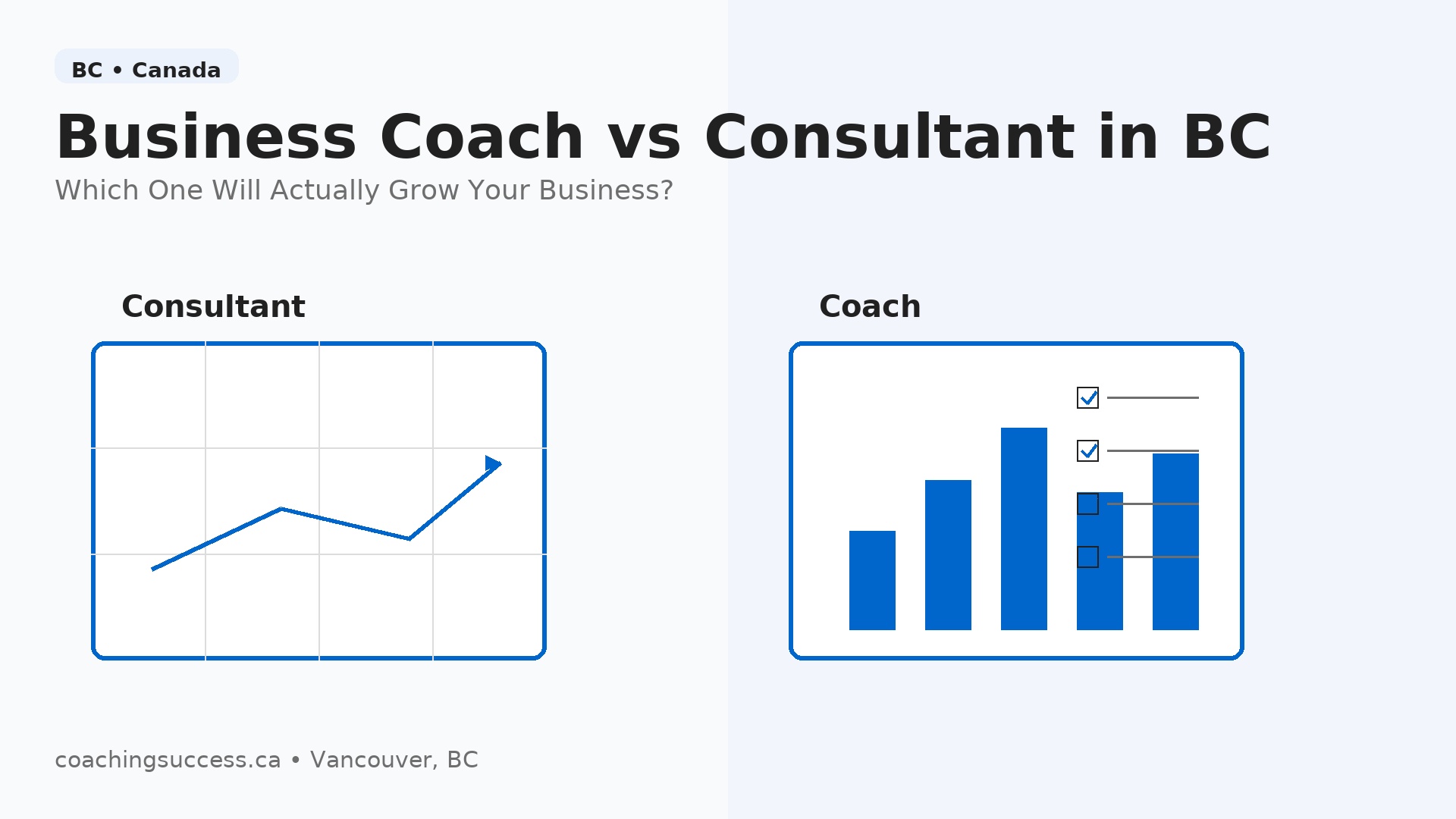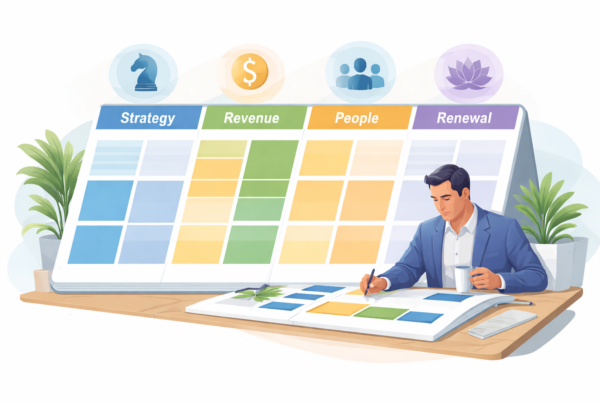Business Coach vs Consultant in BC: Which One Will Actually Grow Your Business?
When growth stalls or complexity rises, most leaders ask the same question: Do I need a consultant with the answers—or a coach who helps me become the leader who finds and executes the right answers consistently? Choosing correctly saves months of time and significant budget.
This guide clarifies the difference, shows when to hire each (or both), and explains why accountability is often the multiplier that turns plans into measurable results—especially in the BC market.
Coach vs. Consultant: The Core Difference
-
Consultant → works for your business.
Provides expert diagnosis, recommendations, and sometimes implementation for a defined problem (e.g., pricing, go-to-market, process redesign). -
Coach → works on you and your leadership team.
Sharpens clarity, decision quality, strategic focus, and accountability—so execution improves across the board, quarter after quarter.
Quick Comparison
| Dimension | Consultant | Coach |
|---|---|---|
| Primary focus | Business problem/project | Leader/team capability & execution |
| Method | Diagnose → recommend → (optional) implement | Clarify → co-create plan → build habits & accountability |
| Time horizon | Short/defined engagement | Ongoing partnership (6–12+ months) |
| Deliverable | Strategy, plan, or solution | Better decisions, stronger culture, reliable execution |
| Risk | Dependency if team can’t execute | Requires leader participation and follow-through |
Want an objective read on which you need first?
👉 Book a free 15-min strategy call: https://calendly.com/joelzimelstern1/15min
Or email joel@coachingsuccess.ca with the subject line “Coach vs Consultant?”

Why Accountability Changes Outcomes
Most companies don’t fail for lack of ideas. They fail from inconsistent execution.
A coach builds cadence (weekly/bi-weekly check-ins), visibility (clear KPIs), and ownership (who does what by when) so the important work gets done—no matter how busy the week gets.
In practice, accountability means:
-
Translating strategy into a short list of high-leverage actions.
-
Defining owners, deadlines, and success metrics.
-
Reviewing progress regularly, unblocking issues fast.
-
Building the leadership habits that keep results compounding.
Consultants may hand you a world-class blueprint; coaches help you make it real—and keep it real.
When to Hire a Consultant (First)
Choose a consultant when you need:
-
Specialized expertise (e.g., M&A diligence, pricing model, ERP selection).
-
Time-boxed outcomes (e.g., market entry plan this quarter).
-
External benchmarking and proven playbooks.
BC context: For sector-specific challenges (e.g., natural resources, tourism seasonality, regulated industries), a consultant with Canadian/BC experience can shorten the learning curve.
When to Hire a Coach (First)
Choose a coach when the constraint is leadership or execution:
-
Strategy exists but follow-through is inconsistent.
-
You’re scaling and need decision frameworks, prioritization, and team accountability.
-
You want a stronger culture: ownership, focus, and predictable delivery.
-
You’re shifting from technician/founder to CEO and need the mindset/skills to match.
BC context: A Vancouver-based coach who understands the local talent market, capital landscape, and regional networks can accelerate your momentum and introductions.
The Hybrid: Consultant + Coach
Many growth companies use both:
-
Consultant delivers the strategy or builds the system.
-
Coach ensures the leadership behaviors, routines, and reviews that make the strategy stick.
If budget allows, this pairing often yields the best ROI: the right plan and the capacity to execute it quarter after quarter.
Curious about a blended plan? Reply “Hybrid” to joel@coachingsuccess.ca and I’ll outline a phased approach for your situation.
Self-Assessment: Which Do You Need Right Now?
Check the first statement that feels most true:
-
☐ “I know the problem. I need expert help to design the solution fast.” → Consultant
-
☐ “We keep starting strong and fading. We need disciplined follow-through.” → Coach
-
☐ “We need a new strategy—and to ensure the team actually executes it.” → Both
-
☐ “I’m moving from founder to CEO and need to lead at a higher level.” → Coach

How to Choose the Right Partner in BC
For Consultants
-
Look for relevant case work in your industry/size.
-
Confirm scope, timeline, and implementation support (if any).
-
Ask for knowledge transfer so your team isn’t dependent.
For Coaches
-
Prioritize fit: candor, challenge, and chemistry.
-
Ask about accountability structures (cadence, KPIs, dashboards).
-
Consider credentials and track record (e.g., executive experience, formal coach training).
Pro tip: Start with a clarity session to define the problem, outcomes, and constraints—then decide whether consulting, coaching, or a blend delivers faster ROI.
Local Advantage: Why a BC-Based Advisor Helps
BC’s economy is entrepreneur-dense and regionally diverse (tech, film, tourism, resources, professional services). A local coach/consultant:
-
Understands provincial regulations and regional buyer behavior.
-
Knows hiring dynamics and compensation norms in Metro Vancouver and beyond.
-
Can open warm intros to peers, talent, and potential partners.
FAQs
Q: Will a coach give me the answers?
A: A coach ensures you make better decisions faster, then execute them. You’ll leave sessions with clear actions and deadlines—not theory.
Q: Can a consultant also hold us accountable?
A: Some do; it’s not the norm. If execution is where initiatives die, layer in coaching.
Q: What if I choose wrong?
A: Begin with a diagnostic. In one session, we’ll determine whether you need a plan, execution support, or both—then proceed efficiently.
Next Step: Get Clarity in 15 Minutes
If you want not just a plan—but the confidence, cadence, and accountability to deliver it—let’s talk.
-
Book a free 15-min strategy call: https://calendly.com/joelzimelstern1/15min
-
Or email joel@coachingsuccess.ca with the subject “Coach vs Consultant?”



